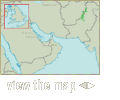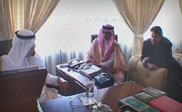|
+ "An Audience with the Crown Prince" 2 October, Riyadh
From Martin Smith 
 We are swerving through heavy late-afternoon traffic towards the headquarters of Saudi Arabia's National Guard where, we are told, we will meet Saudi Arabia's functioning ruler, Crown Prince Abdullah. Given how protective and media averse the Saudis are, this invitation is regarded as unusually special. I'm not sure what to make of it. The crown prince has seen various western journalists over the years, most notably of late was his meeting last spring with New York Times' columnist, Tom Friedman, when the crown prince reached into his desk drawer to unveil his now largely forgotten "Middle East Peace Plan."
We are swerving through heavy late-afternoon traffic towards the headquarters of Saudi Arabia's National Guard where, we are told, we will meet Saudi Arabia's functioning ruler, Crown Prince Abdullah. Given how protective and media averse the Saudis are, this invitation is regarded as unusually special. I'm not sure what to make of it. The crown prince has seen various western journalists over the years, most notably of late was his meeting last spring with New York Times' columnist, Tom Friedman, when the crown prince reached into his desk drawer to unveil his now largely forgotten "Middle East Peace Plan."
But, what the crown prince has never done is answer a reporter's questions in front of a camera. "He doesn't give interviews," I was told when I asked if we could meet and talk to him. "He has never been interviewed on television, not even on state-run Saudi television." As we grind through Riyadh's pre-prayer time traffic, I am doubting that I will be the first TV journalist to interview Saudi Arabia's ruler.
I am imagining that perhaps I will be allowed to shake his hand say a few words of introduction. Actually, I don't even know if crown princes shake hands, although I think I've seen him do it on TV. Mostly, I am thinking that the air conditioning better kick in so that I don't soak through my shirt and arrive looking like I ran across the desert to get there.
Like before so many meetings I have had on this trip, I wonder why I haven't spent more time preparing. Then again, it's hard to prepare thoroughly for something that you think probably won't happen. But, as we approach the gates of guard headquarters I begin thinking, well what if I do meet him? What do I say to the head of a family that controls, or owns -- depending on how you look at it -- one-third of the world's supply of oil; who rules a country that officially recognized and supported the Taliban; a country where stonings, amputations and decapitations are legal punishments for adultery, thievery, and homosexuality; a country where half the population isn't allowed to drive cars, attend university, or show their faces in sunlight; and a country that was home to 15 of the 19 suicide hijackers that ran planes into the World Trade Center and the Pentagon -- and who knows what else if they could have? Thinking about being under prepared only makes me sweat more. There's a lot to ask him and I know I won't have much time.
Before King Fahd, now largely incapacitated by ill health, handed over the running of the country one of his sons, Abdullah, the crown prince headed Saudi Arabia's National Guard. Since his promotion, he still returns each week (month) to his old offices for a majlis, a traditional tribal line-up where anyone with a petition or grievance has a chance to come kiss the hand or shoulder of the prince and submit their requests for redress or simple favor. Requests can range for permission to travel, a grant of money for a family member's medical procedure, or a new school or road. Kings, princes and tribal chief all have majlis. Of course, a majlis given by the king, or under current circumstances, the crown prince is the highest form of the affair.
After a cursory security inspection, we pass the front gate and pull up to the entrance. Car doors open and shut. We are guided through more security. Inside a line of men stands to my right and I am moved over to shake hands with an official whose name, rank or importance I completely miss. We are moved upstairs. Here in the second floor lobby some men move about looking purposeful; others are fidgeting, talking and pacing. There is a lot of adjusting of headpieces and robes. We are ushered into a large hall and asked to walk forward. On either side of the room are five rows of chairs facing inward which are by now full of all sorts of men -- from rough looking tribesmen with gnarled hands holdings canes and staffs to princely types with soft hands bejeweled with diamonds and gold. Ahead of me, opposite the main door is a raised desk and chair against a large picture window looking out over Riyadh. A microphone sits on the desk. I am seated near the front. I am introduced to a man on my right. He is a son of Crown Prince Abdullah's and current chief of the National Guard, a position, of course, that he inherited from his father.
For a long time, maybe 25 to 30 minutes, we wait for the crown prince to arrive. On my left, a very old Bedouin chieftain seems to not be able to sit up straight and is leaning into me.
 |  |
 |  |
 |
| Producer Martin Smith interviews Saudi Crown Prince Abdullah. |
 |
When the crown prince arrives, it happens suddenly, with no particular fanfare. As I would expect, everyone rises to their feet. The prince moves quickly, especially for a 79-year-old man, walking the length of the room and taking his place behind the raised desk with the microphone. After we all sit back down, another man, a cleric, stands up about 30 feet out from and opposite the desk and recites a poem for about 10 minutes.
The majlis begins when all the men in the room around 600 of them, drop all pretense of polite behavior and surge forward toward the front vying for a place in line. But, they form no line. Instead, they jostle and shove. Scott gets caught up in a little melee.
The emotions on the faces of some of the supplicants are what impress me the most. One older man is kneeling near the prince, and looks as if he is crying but can't. His face twists and bottom lip trembles but his eyes are dry. He is being pushed from behind but holds his ground so as not to fall onto the prince's feet. Eventually most but not all men get a few seconds to kneel before Abdullah and ask for whatever they've come here seeking.
When the majlis is over, I am guided into a "private" office along with Abudullah and about 100 other men. Again I am seated near the front and continue my conversation with the Abdullah's son. He tells me his father is a straightforward man. "The shortest distance between two points," my father always says, "is the truth." I talk to him about the looming U.S. invasion of Iraq. "My role," he tells me, "is simple. I will stand my men at the border with Iraq and make sure no Iraqis cross into our country."
Without warning, I hear someone calling, and look up to see that the crown prince is motioning for me to come sit next to him. He tells me through a translator that I can ask "two questions."
Days later I still struggle to remember what it is that I asked him. Scott doesn't remember either. It's all a blur. I remember that he kept turning things around and asked me to answer my own questions. I remember asking about 15 of the 19 hijackers being Saudis. He asked me why I thought Tim McVeigh was an American. And why American schoolchildren go into schools and "shoot around."
On the way to the airport afterwards I am riding with one of the crown prince's close friends. I ask him if he worries about the level of anti-American, anti-western sentiment on the streets of Riyadh. A question that the crown prince did not want to answer. And I ask how will an invasion of Iraq affect people's feelings? He waves his hand in a kind of dismissive fashion at the people on the street outside and says that the "people are fickle, they will change quickly. We shouldn't worry about them too much."

< previous dispatch + next dispatch >

|
London
(Aug. 13-14) |
+ Zubaydah Is Dead
13 August, London |
+ Armchair Jihadists
14 August, London |
Gulf of Oman
(Aug. 15-21) |
+ Faces at a Dubai Mall
15 August, Dubai, U.A.E. |
+ HMCS Algonquin
16 August, somewhere in the Gulf of Oman |
+ On Board the Algonquin
17-18 August, somewhere in the Gulf of Oman |
+ Like an Elephant Chasing a Mouse
17-18 August, Gulf of Oman |
+ Dubai to Karachi
20 August |
+ A Firehose of Information
20-21 August, Dubai - Muscat - Chennai |
Pakistan
(Aug. 22-29) |
+ Old Hash
22 August, Islamabad |
+ Nuclear Neighbors
22-23 August, Islamabad |
+ We Believe in God
24 August, Islamabad |
+ Paranoid in Peshawar
27 August, Peshawar |
+ Bombs or Dust Devils
27-28 August, Peshawar |
+ Rumors and Half Truths
28 August, Peshawar |
Pakistan Border Lands
(Aug. 30-Sept. 4) |
+ On the Road to Chitral
30 August, Dir Khas |
+ Prisoners' Dilemma
31 August, Dir |
+ In the Northwest Frontier
30-31 August, Dir |
+ Border Town
2 September, Chitral to Arandu |
+ Don't Go to Timargarha
1-2 September, Drosh to Timargarha |
+ An American Informer
3-4 September, Peshawar |
Pakistan
(Sept. 5-23) |
+ Road to Nowhere
7 September, Islamabad to Faisalabad |
+ Faisal Town
7 September, Faisalabad |
+ Frustrations
9 September, Faisalabad |
+ The Plight of Women
10 September, Faisalabad |
+ A Little Noticed Gun Battle
10-13 September, Lahore-Karachi |
+ The Madrassa
14 September, Akora Khattak |
+ The Next Big Get
20 September, Karachi - Islamabad |
+ A Circle of Trust
21 September, Islamabad |
+ Indomitable
23 September, Islamabad |
Saudi Arabia
(Sept. 24-Oct. 2) |
+ Inside the Kingdom
24-25 September, Riyadh |
+ My Baffling Question
27 September, Unizah-Buraydah |
+ An Obedient Dissident
27 September, Buraydah |
+ An Audience with the Crown Prince
2 October, Riyadh |
Yemen
(Sept. 25-Oct. 10) |
+ Arriving in Yemen
25-26 September, Sana'a |
+ The Wedding Party
27 September, Sana'a |
+ A Talking Drug
28 September, Sana'a |
+ The World's Most Ancient Skyscrapers
3 October, Sana'a |
+ Americans Are Vampires
7 October, Sana'a |
+ Waiting for Rahma
9 October, Sana'a |
|